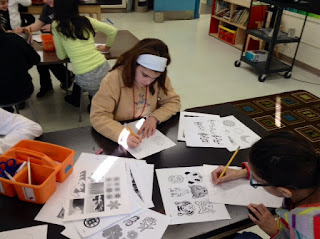Plaster Masks
This spring, 5th grade artists created plaster masks, which took us several weeks. The process involved designing their mask, creating the mask form out of plaster strips, painting their mask and writing an artist statement to accompany their mask on display. We began by discussing masks, why we wear masks, and learning about masks around the world.
Students connected masks to Halloween, as well as masquerade parties and even sports. We talked about how masks can help you hide your identity, or assume a different one. They can also help protect your face, or just be worn for fun.
We learned that masks have a long history and have been created, used, and worn by cultures all over the world. They are also made from a variety of different materials.
For example, in ancient Egypt, masks were used to dress the faces of the dead. Royal death masks were made of gold and bronze and meant to look like the person. In Japan, samurai masks were designed to instill fear in opponents, as well as protect the wearer. They were often made of iron and leather. In Italy, during the Carnival Festival in Venice, elaborate masks are worn to provide mystery. And in West Africa, masks are used in religious ceremonies to communicate with spirits and ancestors. Many are made with wood, ivory or clay.

After learning about masks, students sketched out design ideas for their own plaster mask. Many students were inspired by popular culture, super heroes, symbols, and sports. We also cut plaster strips to prepare for mask making. Mask making was done in two sessions, with half the class making their mask one week, and half the class making their mask the following week. The class also came early to art class, so that we would have enough time to complete three layers of plaster. Thank you to the 5th grade teachers for making extra time for this project!
To make their plaster mask, students began with a plastic mask form that was covered with Vaseline, so that their finished mask would slip off easily when dry. Students dipped pieces of dry plaster in water, then placed them on their plastic mask form and smoothed them with wet fingers to make the plaster come out and cover the holes.
Students made sure to overlap their strips and could choose whether to leave the eye holes open or closed, as well as the mouth. This depended on their design. After three layers of plaster, the masks were left to dry.
After our plaster mask making sessions, students got their dry mask back and were ready to paint! We used acrylic paint (instead of tempera paint, which we usually use) so that they paint would stay on and not flake off the mask later. Students noticed that the acrylic paint dried quickly.
Students spent two to three classes painting their masks, considering how to paint their design in layers so that they could add details on top. Depending on the design, some students had to paint their mask all one color, or two colors, before adding details on top. Other students began with the white base of the mask and painted details directly on top.
On our last mask making class, student added extra details using a variety of different materials. Some students added ears to their animal mask, or feathers to a masquerade inspired mask.
The following class we worked on artist statements for our masks. An artist statement is a written explanation of an artist's work. You can tell the viewer about the motivation and inspiration behind your design, how you made your work, and any additional information you want the viewer to know. Students typed up their artist statements so they could be accompany their mask on display. Below are some examples of our plaster masks on display!



















